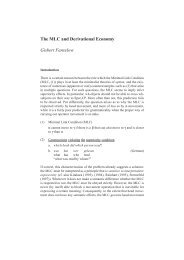Long distance object agreement, restructuring and anti ...
Long distance object agreement, restructuring and anti ...
Long distance object agreement, restructuring and anti ...
Create successful ePaper yourself
Turn your PDF publications into a flip-book with our unique Google optimized e-Paper software.
Bobaljik <strong>and</strong> Wurmbr<strong>and</strong><br />
lower subject position, indicating that for the purposes of binding theory, the <strong>object</strong> is not<br />
in the highest specifier of the embedded clause.<br />
(28) a. N-kosiciy-a eli psi=te wen koseloma-t nisuwihtic-il.<br />
1-know.TA-DIR C˚ all=EMPH someone love-3CONJ spouse-OBV<br />
b. N-kosiciy-a nisuwihtic-il eli psi=te wen koseloma-t.<br />
1-know.TA-DIR spouse-OBV C˚ all=EMPH someone love-3CONJ<br />
both: ‘I know that everyone1 loves his1 spouse’ (Bruening 2001, p264)<br />
Examples of this sort are relevant to our claim in (27)a that AGREE is sensitive to an LFphasemate<br />
condition. That assumption explains why reconstruction is impossible in the<br />
German, Japanese <strong>and</strong> Itelmen cases. Bruening argues instead on the basis of examples<br />
like (28) that AGREE obeys an ‘anywhere’ phasemate condition. Movement to the left<br />
periphery is required at some point in the derivation in order for LDA to obtain, but that<br />
movement may subsequently reconstruct. However, Bruening’s assumption is too weak<br />
to block reconstruction in the cases we have examined. There are at least two ways we<br />
see to resolve this tension, <strong>and</strong> we take no st<strong>and</strong> at this point on which will prove correct.<br />
On the one h<strong>and</strong>, one could seek to assimilate this to the primary versus parasitic<br />
licensing distinction that we have already appealed to in section 4.2; perhaps only<br />
licensing relations need to be respected at LF, hence AGREE as part of licensing obeys<br />
an LF-phasemate condition, while parasitic AGREE respects the same phase boundaries,<br />
yet may be satisfied at any point in the derivation. On the other h<strong>and</strong>, one could attempt<br />
to reduce this instead to the A versus A’ distinction in the movement types involved.<br />
Basic examples of reconstruction in A’-movement show that, if topic(-focus) structure is<br />
read off LF positions, a DP may be interpreted in one position as a topic <strong>and</strong> in a lower<br />
position for binding-theoretic purposes. Within the copy theory of movement, this is<br />
occasionally referred to as feature dispersion.<br />
(29) Herself1, Sue1 likes t.<br />
For our proposals, it would be sufficient to maintain that LF-coherence holds across<br />
scope-binding <strong>and</strong> case positions (if an NP moves across a phase for case-licensing<br />
reasons, it cannot reconstruct), while A’-movement such as topicalization may<br />
reconstruct, so long as sufficient features remain in the high position so as to be visible<br />
for <strong>agreement</strong>. The Hindi facts discussed below point to the same conclusion.<br />
5.2. LDA in Hindi-Urdu<br />
In recent work, Bhatt (2002) examines a LDA construction in Hindi. The salient<br />
properties of Hindi LDA place it squarely within the realm of potentially relevant<br />
constructions; in particular, this LDA construction is restricted to non-finite complements<br />
of <strong>restructuring</strong> verbs. Since LDA is restricted in this way, the <strong>agreement</strong>-scope<br />
correlation should apply in Hindi as well. As Bhatt presents the facts, they are the<br />
following: wide-scope of the <strong>object</strong> over the matrix predicate is blocked when there is no<br />
LDA, <strong>and</strong> LDA makes this scope interpretation available <strong>and</strong> “even preferred” (p.22, see<br />
also Mahajan 1989 (46)). Nevertheless, Bhatt claims that the wide scope reading is not

















